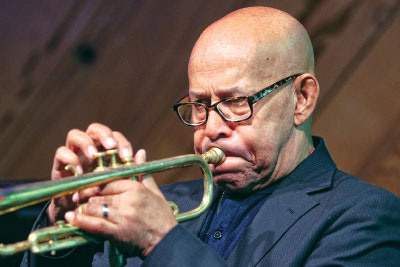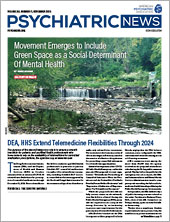There are lots of musicians named “Doc”—Doc Severinson, Doc Pomus, Doc Cheatham, Doctor John the Night Tripper—but not too many are genuine, M.D. doctors. Today, at 83, Eddie Henderson, M.D., is a master of the jazz trumpet, but he arrived at that peak with a detour through several side gigs, including psychiatry.
Henderson, born in New York, was introduced to music and medicine early. His father sang with the Charioteers, a famous Black vocal group in Ohio and later New York, and his mother was a friend of Billie Holliday and Lena Horne. Dizzy Gillespie and Duke Ellington visited his parents. Once, Sarah Vaughn took young Eddie to New York’s Apollo Theater to see Louis Armstrong play. It was his first exposure to the trumpet. Backstage, Armstrong taught him how to make a sound on the instrument.
After a year of lessons, he played the “Flight of the Bumble Bee” for Armstrong, who gave him a book of his transcribed solos inscribed “To Little Eddie. You sure sound good. Keep playing. Love, Satchmo.”
“I didn’t know it was going to turn into the rest of my life,” he recalled in an interview after playing at Baltimore’s Keystone Korner jazz club just before COVID-19 upset the world.
After his father died, his mother married the most prominent Black physician in San Francisco, necessitating a move across the country. Henderson took lessons from the first chair in the San Francisco Symphony, gaining a firm grounding in the instrument, he recalled. “I could play the trumpet, but I knew nothing about jazz.”
Nevertheless, he met leading lights in the jazz world as a high school junior when he shuttled Miles Davis, John Coltrane, Cannonball Adderley, Philly Joe Jones, Wynton Kelly, and others to and from a local music festival.
His stepfather did not support his musical interest, however. He even told Henderson that he would end up as a “bum on the waterfront,” but one of his great strengths was taking such disparagement as a challenge.
Others threw up roadblocks, as well. A teenage fascination with ice skating was briefly stymied by the unwillingness of the San Francisco skating club to admit a Black skater. But during a later stint in the Air Force, he was stationed in Colorado and joined the less-prejudiced Denver Figure Skating Club, under whose aegis he earned a bronze medal at the 1960 Midwestern Figure Skating Championships in Minneapolis.
Henderson aced high school; studied hard at the University of California, Berkeley; and was accepted at Howard University’s medical school. “I had to fill my commitment of spite to my stepfather just to prove him wrong,” he said.
Discipline got him through. “I never missed a class in my life. I took exceptional notes.” He’d spend 8 to 5 at school, absorbing the pearls of wisdom in class; went home and studied for four hours; and then head to the local clubs and play jazz to relieve the tension and make a few bucks. On weekends, he would dash up to New York to listen to the jazz greats.
His decision to enter a psychiatry residency after graduation in 1968 came with an advantage at the time—he’d have more time to follow his musical muse. Back in California, he was assigned to the Clinical Research Ward, an inpatient service at the Langley-Porter Institute at UC Berkeley.
“It was unusual to have an African American in the residency at that time,” recalled Ira Glick, M.D., who was head of the residency program then. “Eddie was a very interesting guy, very smart. He worked all day as a resident and played nights in the Fillmore district.”
Glick and Henderson lost touch until 2019 when Glick was in New Orleans to give a lecture. He strolled over to a jazz festival just in time to hear the announcer introduce “Doctor Eddie Henderson.” Glick stuck around until the end of the show. When Henderson came out, he spotted his old mentor and said: “You saved my life!”
Minimal night call gave Henderson the same opportunity he had in medical school at Howard—medicine by day and music by night. After a year and a half, pianist Herbie Hancock came to town and needed a trumpeter for a week, a week that would last to the present day.
Henderson left the residency and spent three years on the road with Hancock’s group, then three months with Art Blakey, the legendary drummer and bandleader known for nurturing young talent. But after his pay with Blakey mysteriously diminished, Henderson returned to San Francisco and a clinic in Haight-Ashbury, this time as a general practice physician. The doctor who hired him had no qualms about encouraging Henderson’s musical career over the next 10 years.
“He let me go on tour and paid my salary anyway,” he recalled. “It was an ideal situation. I never wore a suit. A lot of patients were street people.”
People knew he was a musician, and he often went to work with his trumpet, all the better to spend his nights playing at local clubs. Occasionally, the two worlds of Eddie Henderson intersected, or maybe collided, like the night when Thelonius Monk, the jazz piano legend, arrived as a patient in the clinic.
Eventually, Henderson was able to put down his stethoscope and make a full-time living with his horn. The path has taken him through 26 albums as a bandleader, dozens more as working with other musicians, and uncountable gigs in clubs and concert halls. He still fronts his own group and often joins an all-star band, The Cookers, on the road. He also passes along his experience to a younger generation of trumpeters as a member of the jazz faculty at Oberlin College’s Conservatory of Music.
Yet those long ago echoes of his life as a physician and a psychiatrist in training still resonate, just like the notes emanating from his trumpet over the years.
“I couldn’t be a good doctor unless I was healed, and music is the thing that heals me,” he said. “Music is like therapy—it puts me at ease with who I am. Then I can relate to other people and spread the joy.” ■

